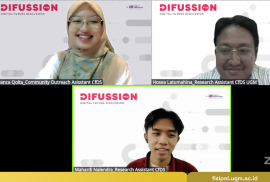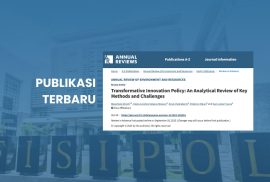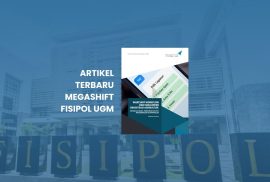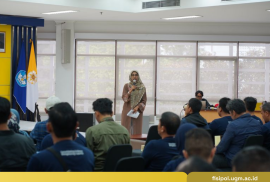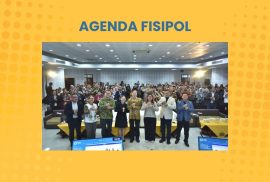Yogyakarta, October 15th 2025─Artificial Intelligence (AI) is now a hot topic that is not only discussed in academic circles, but also in industry and public policy. Through DIFUSSION (Digital Future Discussion) #128 entitled “Indonesia’s AI Trajectory: From Hype to Investment Challenges,” the Center for Digital Society (CfDS) UGM traces the journey of AI in Indonesia, from technological euphoria to the real challenges in building a sustainable ecosystem that is in line with national interests.
SDGs 9: Innovation and Infrastructure
Yogyakarta, 9 September 2025 – The Center for Digital Society (CfDS) at the Faculty of Social and Political Sciences (FISIPOL) Universitas Gadjah Mada celebrated its tenth anniversary under the theme “A New Era to Rethink Digital.” The celebration also marked the launch of the 2025 Digital Intelligence Course (MKKD), which carries the topic “Building a Human-Centered and Inclusive Digital Ecosystem.”
Since its establishment ten years ago, CfDS has consistently empowered communities through research and advocacy in digital transformation. One of its flagship initiatives is MKKD, a free digital literacy class initiated in collaboration with the Ministry of Communication and Digital Affairs (Komdigi) in 2020. To date, MKKD has reached more than 40,000 participants and features instructors from across sectors, including academia, government, and industry.
Yogyakarta, 10 September 2025–The development of Artificial Intelligence (AI) is forcing the world to transform. Since the massive advancement of AI, disruption has emerged in various fields, including education. The Global Humanities Alliance (GHA) held an online seminar on using AI to support the learning process on Wednesday (3/9). The panel discussion, “Digital Transformations: AI and Teaching,” featured experts from the Faculty of Social and Political Sciences, Universitas Gadjah Mada.
One of the lecturers from the Department of International Relations (DIHI), Faculty of Social and Political Sciences (FISIPOL) UGM, Suci Lestari Yuana, Ph.D., has once again achieved international academic recognition. Together with her collaborators, she has recently published a scholarly article in the prestigious journal Annual Review of Environment and Resources, titled “Transformative Innovation Policy: An Analytical Review of Key Methods and Challenges.”
The article discusses Transformative Innovation Policy (TIP), a new generation of innovation policy designed to address increasingly complex social and environmental challenges—from energy and food crises to mobility systems that remain entrenched in unsustainable modes of production and consumption. The authors emphasize that merely improving technologies or financial instruments is no longer sufficient. Systemic innovations and transformative policies are needed to enable just transitions, ensuring both social justice and planetary health.
Two lecturers from the Faculty of Social and Political Sciences (FISIPOL), Universitas Gadjah Mada, Massageng Widagdhaprasana and Hempri Suyatna, joined as speakers at the online Townhall Muda Yogyakarta forum under the theme “Youth Entrepreneurship Innovation.” On this occasion, both highlighted opportunities, challenges, and innovations in developing a sustainable social entrepreneurship ecosystem.
Director of the Creative Hub (C-Hub) FISIPOL UGM, Massageng Widagdhaprasana, emphasized that FISIPOL’s role through C-Hub is not merely as an incubator but also as a catalyst in building a youth entrepreneurship ecosystem. “We aim to establish a transdisciplinary learning ecosystem that generates new values in social entrepreneurship. Young people must be encouraged to adapt through various cross-sector collaborations,” he explained.
New Release: Megashift FISIPOL UGM Article
“Digital Orchestration for Indonesian Agriculture: From WhatsApp Workflow to Food Security”
By: Setiawan Guntoro
Megashift FISIPOL UGM has once again published an article that sparks discussion on the future of agriculture and food security in Indonesia. This piece highlights a simple yet revolutionary idea: how an everyday app like WhatsApp can become the backbone of agricultural digitalization.
The article sheds light on a long-standing issue in agriculture, particularly in broiler farming: the slow flow of field data from farms to management, which often leads to delayed and risky decision-making. Many agritech startups have failed because their applications did not match farmers’ habits. However, WhatsApp—used by 9 out of 10 Indonesians—emerges as an alternative solution.
Yogyakarta, August 28, 2025—The Faculty of Social and Political Sciences (FISIPOL) Universitas Gadjah Mada (UGM) welcomed a group of participants from the Training on the Preparation of Strategic Plans (Renstra) for Regional Government Agencies of Bogor Regency. The program, facilitated by the Center for Capacity Development and Cooperation (PPKK) FISIPOL UGM, was designed as a campus tour and took place on Thursday morning (28/8).
The visit began with explorations to several faculties at UGM, including the Faculty of Forestry and the Faculty of Law, before concluding at the Faculty of Social and Political Sciences (FISIPOL). At FISIPOL UGM, the participants were welcomed by the Executive Secretary of PPKK, Dr. Pradhikna Yunik, followed by a presentation from Dr. Maharani Hapsari titled “Building Regional Competitiveness: Mapping Economic Potential and Innovation Based on Science and Technology.”
The Creative Hub (CHub) of the Faculty of Social and Political Sciences, Universitas Gadjah Mada (FISIPOL UGM), organized a Knowledge Exchange Program titled “Tech for Earth: Sustainable Enterprises for the Future” on Friday, August 22. This online event was part of the CHub Batch 9 Talent Pitching series, which focuses on fostering social entrepreneurship in the context of sustainability challenges.
The webinar explored the theme of Future-Fit, an approach that emphasizes social justice, economic inclusion, and environmental restoration and protection as foundations for a sustainable future. Technology, in this discussion, was positioned not merely as a tool but as a key infrastructure that supports systems—accelerating innovation, expanding impact, and building adaptive and collaborative mechanisms aligned with sustainability principles.
The Center for Digital Society (CfDS), Faculty of Social and Political Sciences, Universitas Gadjah Mada (FISIPOL UGM), hosted the Information Resilience and Integrity Symposium (IRIS) 2025, an international academic and policy forum addressing the challenges of Generative Artificial Intelligence (GenAI).
The event was held in collaboration with the Safer Internet Lab (SAIL)—an initiative by the Centre for Strategic and International Studies (CSIS) and Google Indonesia—together with CfDS FISIPOL UGM. IRIS 2025 provided a cross-sector dialogue space to respond to the impacts of GenAI on democracy, digital security, and social life across the Asia-Pacific region.
Yogyakarta, 19 August 2025–The phenomenon of Roblox online gaming, which is now popular among Indonesian children, has attracted public attention, especially regarding the potential risks and security of the digital space for the younger generation. In response to this, Dr. Adrian Indro Yuwono, S.I.P., M.A., or familiarly known as Mas Dadok, a lecturer in Communication Science at Universitas Gadjah Mada (UGM) who specializes in cultural studies and new media, emphasized the importance of digital literacy and the responsibility of various parties in protecting children in cyberspace.

